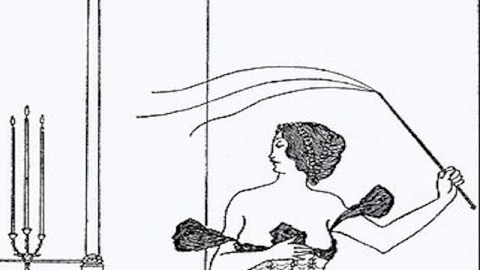Self-Righteousness and Kink: Perfect Together?

Props to my colleague Lindsay Beyerstein for this great catch yesterday: Tea Party favorite Sharron Angle’s campaign received a donation from someone who listed her employer as “husband” and her occupation as “slave.” Maybe it’s just a joke (boring). Or maybe this couple is in one of those Christian “submitted wife” relationships (unlikely, given that “slave” isn’t the sort of rhetoric that culture promotes). But maybe this is an “out” dominant/submissive couple. That shouldn’t be a surprise, if so. Contrary to stereotypes, there’s good evidence that conservatives worldwide are more likely than liberals to have non-vanilla sex lives.
Obviously I’m not talking about high-profile Republican kink, like the $2000 the party spent at a bondage-themed strip club or the curious habits of some of its senators. We’re looking at the rank and file. In this online survey, for instance, 81 percent of Republican respondents reported that they’d used blindfolds, handcuffs or other restraints during sex. Democrats came in at 77 percent on that one. Almost half the Republicans said they had filmed themselves during sex, compared to 38 percent of the Democrats.
Of course, the sample here was biased (it consisted of visitors to the website of Good Vibrations, the sex-toy store). A statistically sounder indicator is Benjamin Edelman’s finding that in the United States, “red” states have the highest rates of subscription to online porn. You can read the paper, “Red Light States,” in pdf form, here. Similarly, as P.Z. Myers showed last month, for Google searches of kinky pornographic terms (“horse sex,” “rape video” and the like), the leading nations are officially cultural conservatives: Pakistan, India, Saudi Arabia and the United Arab Emirates.
Are these data signs of the allure of the forbidden? Maybe. Perhaps, though, they reflect what Chen-Bo Zhong and Katie Liljenquist call the “Macbeth effect,” after Lady Macbeth’s attempt to wash away her sins by scrubbing her hands. Some years ago, Zhong and Liljenquist found that people who’d been prompted to think about a past ethical lapse were more eager to wash their hands then were people who had been reminded of some virtuous act they’d done. The washing ritual had an effect on their behavior: Asked to give time for no pay to a desperate grad student’s project, three-quarters of those who had not washed did volunteer. Of those who did wash, only 41 percent stepped forward to help.
Similarly, Simone Schnall and her colleagues have found that letting people wash has an effect on how they feel about using a kitten to get off sexually, taking money from a lost wallet, or other ethically dubious acts. Cleaning up, which makes people feel purer physically as well as morally, left them more accepting of the kitten-sex idea than were people who, not having washed, felt themselves to be a little dirtier.
We tend to think that a self-righteous sense of your own virtue makes you less accepting of “sin,” however it’s defined by your community. (Important caveat there: I’m not passing judgment on dom/sub couples or Pakistani “donkey sex” searches; rather, I’m focussing on the gap between ideology in the public square and whatever is whimpering, meowing or purring contentedly in one’s private life). But maybe our expectations get it exactly backwards. Perhaps believing yourself to be the holiest, purest, most righteous and civic-minded paragon in the neighborhood is just the sort of mindset that makes a search for “camel sex,” or “sub lifestyle,” feel like no big deal.
Benjamin Edelman (2009). Red Light States: Who Buys Online Adult Entertainment? Journal of Economic Perspectives, 23 (1) DOI: 10.1257/jep.23.1.209
Zhong CB, & Liljenquist K (2006). Washing away your sins: threatened morality and physical cleansing. Science (New York, N.Y.), 313 (5792), 1451-2 PMID: 16960010
Schnall S, Benton J, & Harvey S (2008). With a clean conscience: cleanliness reduces the severity of moral judgments. Psychological science : a journal of the American Psychological Society / APS, 19 (12), 1219-22 PMID: 19121126![]()





